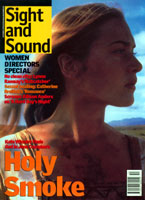Primary navigation

USA 1999
Reviewed by Leslie Felperin
Our synopses give away the plot in full, including surprise twists.
Helen is a divorced single mother who owns a bookshop in Loblolly-by-the-Sea, Massachusetts. One day while opening the mail, she finds an unsigned love letter, addressed only to "Darling", which speaks of the impossibility of the writer ever being with its addressee. Assuming it was meant for her, Helen wonders who her admirer could be. Her college-boy employee Johnny finds the letter and thinks Helen wrote it and intentionally left it for him to find. He drops a hint to let Helen know he's read it, which makes her think he's the letter's author. Meanwhile, Helen's best friend, the shop's manager Janet, finds the letter and assumes local fireman George wrote it for her, even though he has been carrying a torch for years for Helen. Meanwhile, Helen has started a secret affair with Johnny but still goes out on a couple of dates with George. When Helen tells Janet the letter wasn't for her, they argue and fall out.
Meanwhile, young Jennifer has developed a crush on Johnny and cuts all her hair off when he rebuffs her advances. Helen's mother Lillian and grandmother Eleanor return from an extended holiday, and Lillian comes out as a lesbian to Helen, revealing she's been in love for years with local historian Constance Scattergoods. The town's policeman Dan finds the letter and, pretending he wrote it, proposes with it to his girlfriend. Helen breaks off with Johnny in favour of George. Constance and Lillian find the letter and sit musing on how it had been lost - Constance had written it to Lillian years ago.
A romantic comedy focusing, unusually this year, on characters past puberty, The Love Letter seems genetically engineered to serve as video popcorn fuel for girlie nights in, its theatrical release a mere formality (although it has done surprisingly well at the box office in the US). Although ineffably slight with its soapy focus on a mature single mother torn between two equally toothsome if bland suitors, this film more than adequately meets its target audience's demands for cheerfully lachrymose drama. A certain bittersweetness - like milk chocolate chased with cheap beer - bubbles out its thematic concern with the 'wrong' turns and missed opportunities of love. Because Helen never found a secret note in a postcard sent years ago, she didn't get it together with George; in the present, because she finds an anonymous letter she ends up embroiled in an affair with the ardent young Johnny.
It's the sort of too-neat parallelism that screenwriting courses encourage, though presumably the conceit originates in Cathleen Schine's source novel, which is probably also to blame for the sickly, homey prose of the titular love letter in which the author waxes lyrical about its correspondent "when I tie my shoe... when I peel an orange."
Funnily enough, the inspiration to make the film apparently sprang from it's leading actress and producer Kate Capshaw reading a review of the book. Legend has it that she bought the rights to the book out of her own pocket, but the $30,000 wasn't even noticed missing from the family cookie jar by her husband, Steven Spielberg. Nonetheless, his DreamWorks studio has produced the film, and a happy-slappy family atmosphere cosies over the proceedings like a backseat tartan rug (one of the Spielberg enfants even has a walk-on part).
Director Peter Ho-Sun Chan (formerly based in Hong Kong and director of Comrades, Almost a Love Story) coaxes warm, low-key and likeable ensemble performances from his cast of television actors and lesser-known stars and creates the occasional soft-focus effect by shooting through age-warped windows. On the evidence of the easy competence he displays here, he shouldn't have much trouble securing future work in Hollywood.